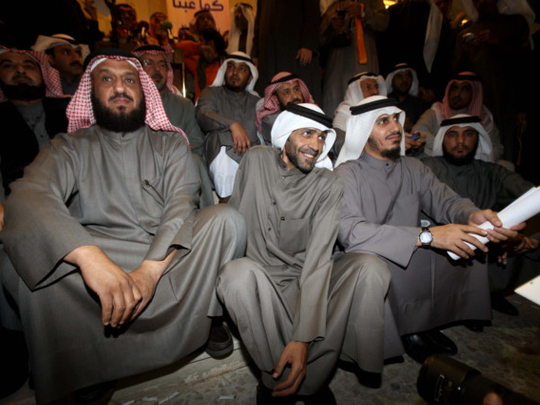
Manama: Kuwait’s opposition said that it would move ahead with the launch of a coalition that brings together trade unions and political forces.
The decision is part of an escalation planned by opposition figures after a court this week sentenced three former lawmakers to three years in prison each for undermining the status of the emir in speeches they delivered in October.
“I invite all trade unions, public societies, political movements and former MPs to attend the meeting that will announce the formation of the coalition of the opposition,” Musallam Al Barrak, a former lawmaker who has been spearheading the opposition movement, said on Wednesday.
The opposition had pledged the reinvigoration of its protests hours after the criminal court on Tuesday announced its sentences against Falah Al Sawwagh, Khalid Al Tahoos and Bader Al Dahoom.
According to the case papers, the three ex-MPs attacked the Emir at a meeting held in October at the private hall of former lawmaker Salem Al Namlan.
The suspects denied the charges and were initially held for 10 days before they were released on KD5,000 (Dh65,200) bail each.
Kuwait has slipped into a political crisis following a decision by the Constitutional Court, the country’s highest court, to dissolve the parliament in June after it ruled that the decrees calling for dissolving the previous legislative house and for elections in February were unconstitutional.
The dissolution was followed by the amendment of the 2006 election law that reduced the number of candidates a voter could elect from four to one.
The opposition, which dominated the parliament, considered both decisions as a move to erode its power and curtail its influence and staged several demonstrations and rallies.
The three former lawmakers used one of the public rallies in October to address the crowd and reportedly undermine the status of the Emir.
Action by opposition however slowed down after a new parliament was elected in December and its figures had divergent views on the tactics to be adopted.
The call to reunite forces and reinvigorate action is likely to be resisted by other political and trade union forces and parliamentarians in the country opposed to street pressure.
“The real solution to the crisis is only through a national dialogue with the participation of all political formations, NGOs and all components of the Kuwaiti society,” Fayez Al Mutairi, the head of Kuwait Trade Union Federation (KTUF), said.
MP Khalid Al Adwa said he regretted the tendency by some people “to stir the street to achieve goals that do not serve the interests of Kuwait or Kuwaitis.”











